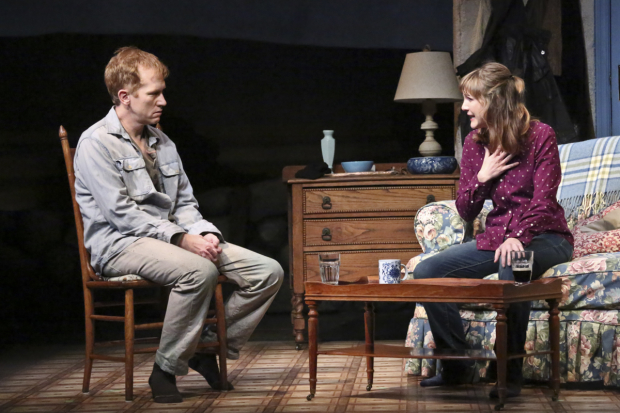Outside Mullingar

(© Michael Lamont)
Outside Mullingar feels like a memory play of the distant past that is set in modern times. The farming territory of Killucan, Ireland, has a timeless aura. Into this delicate setting, Shanley beautifully tells a quiet tale of unrequited love, where the characters are not so much repressed, but gloomy about what they think they can't have.
Chris Muldoon has passed on. His widow (Robin Pearson Rose) and her spinster daughter, Rosemary (Jessica Collins), have gathered at the Reilly's next-door neighbor for Guinness beer and condolences. The Muldoons and the Reillys have had bad blood for decades due to a dispute over a piece of land that sits at the foot of Reilly's property but is owned by Muldoon. Now that the stubborn Chris Muldoon has died, Tony Reilly (Jarlath Conroy) hopes to convince the widow to sell him back what he had given up as collateral for a loan 30-odd years ago. The land's ownership is more complicated and is tied to an incident from the past between Rosemary and Tony's youngest son, Anthony (Dan Donohue), from when they were adolescents.
The land dispute plot is a jumping-off point to reveal relationships that have been stuck in neutral. Rosemary and Anthony have lived next-door to each other all their lives in the isolated outskirts of midland Ireland, and yet, they have refused to confront their feelings for each other, unsure if they are enemies, friends, or soul mates. They are both stubborn for similar reasons: She refuses to relate to him after their childhood incident, while Anthony fears that the secret he harbors, which once chased away his childhood love would turn Rosemary away as well. So instead of risking it, he keeps her at a distance.
For audiences most familiar with Shanley's Pulitzer Prize-winning Doubt, they may expect the secrets to be nefarious, but this is a gentle, quirky tale, one more attune to love and frustrations of the Castorini family from Moonstruck, where old wounds are meant to heal instead of fester, and family obligations uncover a devoted bond that had been left unspoken .
Shanley's lilting and poetic dialogue is a homage to his family’s Irish heritage. There is humor in it as well. Not an out-and-out comedy, Shanley’s conversations contain much gallows humor about pending death, which the older characters especially take with indifference. Director Randall Arney keeps the two protagonists stationary in their scenes together. They barely move, which only tightens the tension as if both characters are trapped in mud. They are inert in their lives, caught between obligation for the land and insecurity about their purpose in this world.
The play introduces Rosemary a scene after everyone else, bundled up in the cold, avoiding the rain, and inhaling a cigarette. Actress Collins uses that first image to bare her character's aloofness. When Collins does erupt, however, first demanding the older Tony to respect his son, and later in the play, when pleading the younger Anthony to count for something, she's riveting. Donohue plays Anthony as a man who knows what he wants, but doesn't think he deserves it. He broods and circumvents till he finally releases all his fears and yearnings. Conroy and Rose, play familiar characters in Irish tales, the stalwart older generation who allow pride to rule their lives. They bring a biting humor to their parts. Conroy's bed scene with Donohue exposes such compassionate between a father and son that it will evoke pure emotion without manipulating the audience.
Anthony T. Fanning's set juxtaposes the cluttered facade brick home of the Reilly men with the Muldoon's more pastoral, feminine living room. In the only scene outdoors, Fanning's soaking-wet barn is aided by Daniel Ionazzi's murky lighting and sound designer Jonathan Burke's raindrops hitting the tin roof and muddy ground.
Just as John Patrick Shanley had constructed a fairy tale version of Manhattan in his Oscar-winning screenplay of Moonstruck, in Outside Mullingar, he has built a fanciful Ireland, still encased in past rituals and superstitions, but magical enough to reignite long ignored passions and regale the audience with a simple Irish love story.










